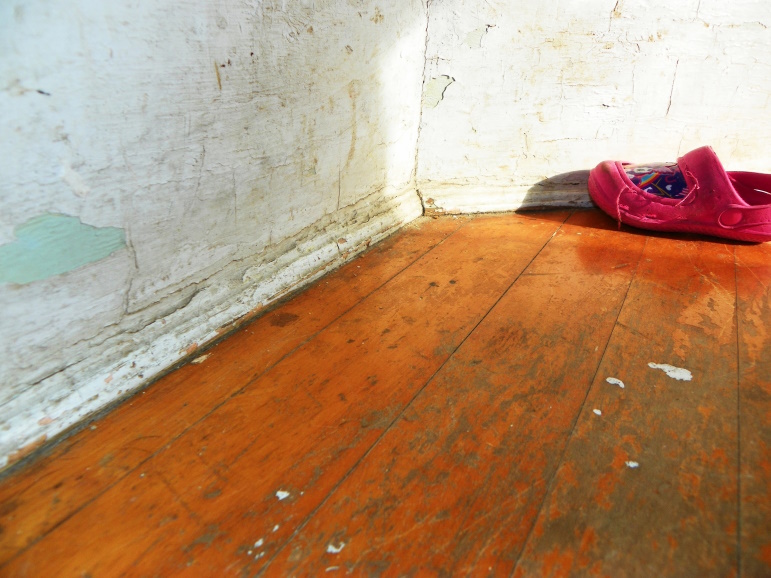City Regulators Can Require Fixing of Lead Hazards — If They Can Find Landlords
Out-of-state landlords, ever-changing owners elude Milwaukee Health Department.

Lead poisoning of children has largely been tied to contact with old, peeling paint. This Milwaukee rental home was inspected for lead in 2015. The city of Milwaukee may penalize landlords who don’t fix lead hazards in their properties. But only if they can track them down. (Matt Campbell / Wisconsin Watch)
This story was originally published by Wisconsin Watch.
It was one landlord. And another. And another.
By the time Deanna Branch learned of severe lead hazards in her home several years ago, she wasn’t even sure who owned the North Side Milwaukee house she was renting.
When her son Aidan was sent to the hospital for the second time with severe lead poisoning, the Milwaukee Health Department initially struggled to find the landlord responsible for removing the hazards — a problem the department says it often encounters.

Deanna Branch sits in the bedroom of a Milwaukee apartment her family were moving out of on July 1, 2023. Her son Aidan was sent to the hospital with severe lead poisoning linked to a previous apartment. The Milwaukee Health Department initially struggled to find the landlord responsible for removing those lead hazards. (Sara Stathas for Wisconsin Watch)
The city of Milwaukee may penalize landlords who don’t fix lead hazards in their properties, but only if they can track them down.
A growing share of Milwaukee property owners live outside of Wisconsin. And in properties where low-income renters live, ownership frequently changes, leaving tenants confused about who should be held accountable for any hazards.
Out-of-state investors are increasingly buying properties in Milwaukee’s Black-majority neighborhoods, according to a report by John Johnson, a research fellow in the Lubar Center for Public Policy Research and Civic Education at Marquette University Law School.
Landlords outside of Wisconsin own 24% of rental properties in majority Black wards, a 9.3 percentage point leap since 2018, according to the report. Yet from 2018 through September 2022, the number of out-of-state-owned houses in majority white neighborhoods fell by nearly 100, the report said.
The Milwaukee Department of Health Services struggled to find Dennise Honegger’s landlord after tests showed her daughter and grandson were lead-poisoned. The department eventually tracked him down in California where he was difficult to reach, Honegger said. Some lead abatement happened at Honegger’s rental, but only sporadically as the landlord did not consistently pay contractors, she added.
State law does not limit how often landlords change their business names, and those that frequently change their limited liability companies are particularly hard to find, said Michael Mannan, the health department’s director of home environmental health.
Allowing cities to set up and fund rental registry programs would help address this problem, Mannan said, but state laws that limit local power to regulate rental properties make doing so difficult.
“We’d know who the owner is, you’d have to renew every year. If you had code violations, you wouldn’t be allowed to rent your property, Mannan said. “All that we’re allowed to do are Band-Aids.”
Mannan said his colleagues are lobbying lawmakers to require that agents submit additional information when registering an LLC — an “uphill climb” in the current landlord-friendly Legislature, he acknowledges.
Heiner Giese, an attorney and lobbyist for the Rental Property Association of Wisconsin, said he is not aware of landlords that are changing their business names to avoid enforcement.
Changing an LLC name still requires paying state fees and listing a registered agent, Giese said.
“There’s somewhat of a myth out there that landlords are hiding,” he said. “You’ve got to have some sort of live human being that’s connected with an LLC.”
The nonprofit Wisconsin Watch (www.WisconsinWatch.org) collaborates with WPR, PBS Wisconsin, other news media and the University of Wisconsin-Madison School of Journalism and Mass Communication. All works created, published, posted or disseminated by Wisconsin Watch do not necessarily reflect the views or opinions of UW-Madison or any of its affiliates.
More about the Lead Crisis
- Rep. Madison Proposes Restoring Local Control Over Lead Inspections - State Rep. Darrin Madison - Jan 6th, 2026
- $43 Million Later, MPS Says Classrooms Are Safe From Lead Dust - Corrinne Hess - Dec 18th, 2025
- MPS Buildings Cleared of Lead-Paint Risks after 10-Plus Months of Work - Milwaukee Public Schools - Dec 17th, 2025
- Wisconsin Moves to Require Lead Service Lines Replaced By 2037 - Danielle Kaeding - Dec 11th, 2025
- Gov. Evers, DNR Announce More Than $159 Million to Ensure Clean, Safe Drinking Water for Wisconsinites in 29 Municipalities - Gov. Tony Evers - Dec 10th, 2025
- EPA Announces $3 Billion in New Funding for States to Reduce Lead in Drinking Water - U.S. Environmental Protection Agency - Nov 25th, 2025
- Wisconsin Communities Get $282 Million for Drinking Water Projects - Danielle Kaeding - Nov 19th, 2025
- MKE County: County Launches Lead Abatement Program - Graham Kilmer - Nov 9th, 2025
- Milwaukee County Launches Lead Remediation Program to Reduce Lead-Based Paint Hazards in Homes in Suburban Communities - David Crowley - Nov 5th, 2025
- Wisconsin Improves Child Lead Testing Rates, Urges Continued Testing and At-Home Prevention - Wisconsin Department of Health Services - Oct 21st, 2025
Read more about Lead Crisis here


















….but state laws that limit local power to regulate
rental properties make doing so difficult.
Properties are not being regulated, lead is.
If enforcement is through a jurisdiction limited by
property, law, that blatant error must be corrected.
Sending a bill or attaching a lien lien against the property
generates an expense to the city and does not guarantee
timely remedy.
To remedy reachability problems, try something like this:
After a 15 day notice to the owner of a
site having a hazardous lead level, the city would issue an
immediate termination of rent obligation until adequate
remediation efforts commence on the site.
This notice should be sent
within 3 business days of the city receiving
results showing illegal levels of lead.
Wherever possible test result should be determined
within 72 hours after the test.
Rent termination notices should be numbered serially
if owner cannot be located and rent is mailed,
notice to owner should be sent to the
same address as rent. If rent is paid on site
or collected by an agent, it may be best if the
tenant be provided with 2 copies of the notice,
also serially numbered, one to present to owner or agent,.